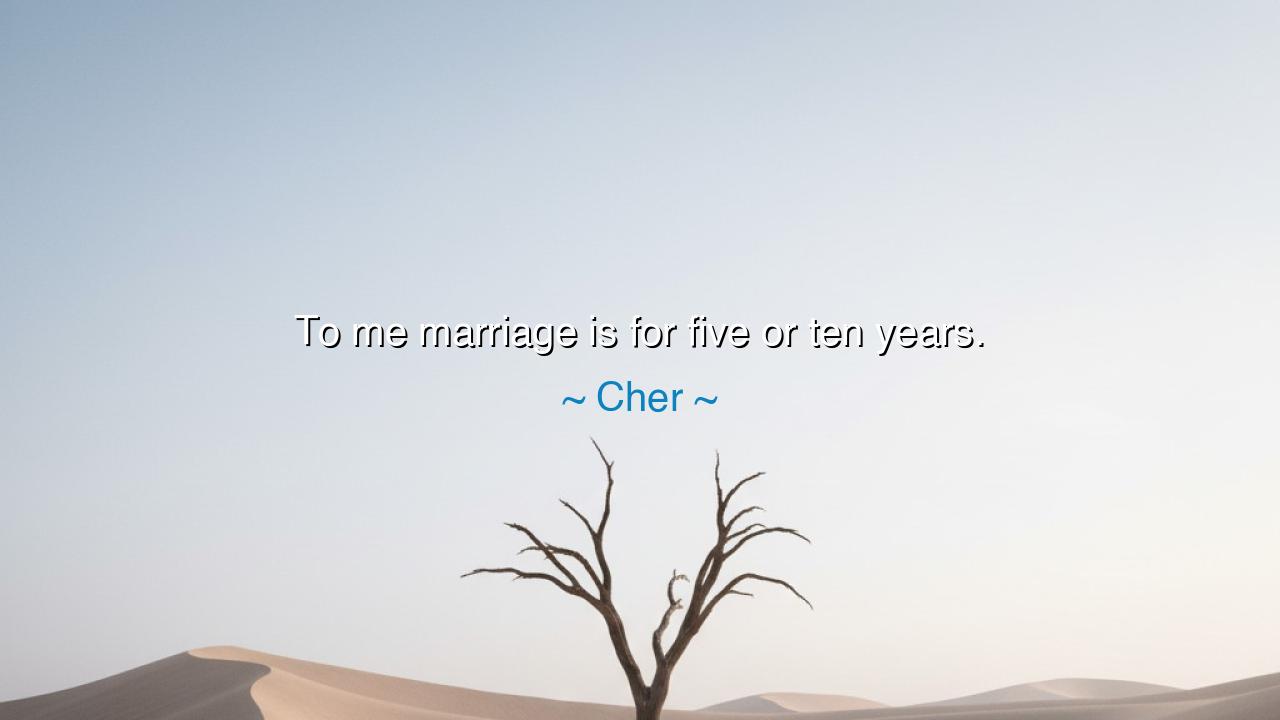
To me marriage is for five or ten years.






In the bold and unflinching words of Cher, the icon of independence and reinvention, there rings a truth that defies convention and invites reflection: “To me marriage is for five or ten years.” At first hearing, her statement may seem rebellious, even dismissive of tradition. But beneath its daring tone lies a philosophy both ancient and profoundly human—the belief that love, like life itself, is not a static bond but a living cycle, a flame that must be renewed or allowed to fade with grace. In her words, Cher does not mock marriage; she redefines it as an evolving journey rather than an unchanging chain. She speaks from the vantage of a woman who has lived greatly, loved deeply, and learned that permanence is not always proof of love’s worth.
The meaning of this quote lies not in cynicism, but in wisdom born of experience. Cher, who has long stood as a symbol of freedom—both artistic and personal—understands that love flourishes when it is chosen, not endured out of duty or fear. By saying marriage should last “five or ten years,” she reminds us that relationships, like seasons, require renewal. The ancient philosophers taught that all things change, that the river of life flows endlessly forward; to demand that love remain forever unchanged is to fight against nature itself. Cher’s words, then, are a call to honesty—a recognition that love must be tended like a fire, and when the fire no longer warms the soul, it is not failure to release it, but courage.
The origin of this idea can be found not only in Cher’s personal history, but in the universal pattern of human love. Having been married twice—to Sonny Bono and Gregg Allman—Cher knew both the ecstasy and exhaustion of partnership. She lived through marriages that were creative and chaotic, nurturing and demanding. When she speaks of marriage lasting only “five or ten years,” she speaks not of limitation, but of authenticity—that every union, no matter how brief or long, must be lived fully and truthfully within its time. To her, the measure of a relationship’s value lies not in its length, but in its honesty, intensity, and growth. She saw that to cling to love past its season can turn tenderness into resentment and devotion into duty.
History, too, offers its examples of love that understood the sanctity of change. Consider the tale of Cleopatra and Julius Caesar, and later, of Cleopatra and Mark Antony. Each union, though finite, was monumental, shaping nations and hearts alike. Their love was not meant to endure eternally—it was meant to burn brightly, to leave a mark upon history and upon the soul. The ancients did not always measure love by longevity but by its power to transform. Cher’s words echo that same philosophy: that love is divine when it uplifts, and tragic only when it becomes imprisonment. For the essence of love, she implies, is not ownership, but freedom—the freedom to grow together, or to part with grace when growth takes different forms.
Her statement also holds a deeper reflection on the modern world, where life itself has become longer and more complex. In ages past, marriage for life often meant twenty or thirty years; now, it may stretch twice as long. The soul, however, still hungers for evolution, for renewal of purpose and passion. Cher’s view challenges us to approach love not as a single unbroken promise, but as a series of conscious choices. Every few years, partners must ask themselves: Do we still bring joy to one another? Do we still grow together, or merely coexist? Her wisdom invites us to treat love as a living thing, requiring care, truth, and the bravery to evolve.
And yet, Cher’s vision does not reject the beauty of lasting love—it demands that it be alive. A marriage that endures for decades should do so because both hearts continually choose it, not because time demands it. In her vision, love becomes sacred again, not because it is permanent, but because it is intentional. The vow, renewed by will and not bound by fear, becomes more meaningful than any blind endurance. Hers is a call to those who confuse longevity with virtue, reminding us that authenticity is the higher ideal. To stay together without love is a kind of death; to part in truth is a rebirth.
Therefore, O listener, take this lesson into your heart: cherish love while it burns, and release it when it no longer gives light. Measure not your worth by the length of your unions, but by the honesty and courage with which you live them. If you choose marriage, renew it in spirit each day, for love must be chosen again and again to remain real. And if you choose to end it, do so without bitterness—for even the stars, which burn for eons, eventually fade to make way for new light.
So remember the enduring wisdom of Cher, who speaks not as one against love, but as one who reveres it enough to tell the truth: that love, to be holy, must be free. Let your heart be bold enough to live fully within love’s seasons—to enter it without fear, and to leave it without regret. For in doing so, you will honor both love’s beauty and life’s impermanence, and in that balance lies the truest form of devotion.






AAdministratorAdministrator
Welcome, honored guests. Please leave a comment, we will respond soon